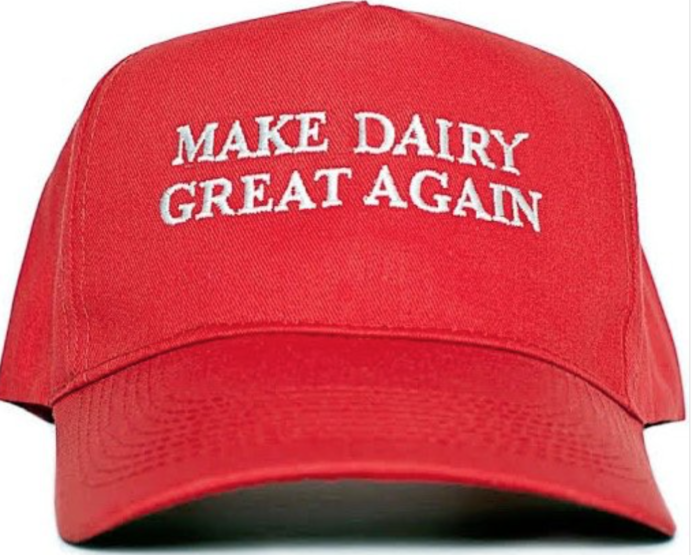Fascinating piece on the splintering of Farming political muscle in NZ on Newsroom that explains why it’s gone so feral and Trumpian…
Divided they fall: NZ’s complex farming future
The wave of farmer protests in New Zealand may seem to be premised on a series of slightly incoherent policy claims, but they are grounded in a rock-solid sense of cultural grievance and nostalgia. What is evident in these protests are the last sighs from what used to be the most powerful and unified cultural and political force in New Zealand history.
Farmer power in the mid-20th Century was premised upon huge levels of economic power, in a formal political system that rewarded rural voters and sent a procession of farmer politicians to Wellington, and also in the indirect influence of a range of farming-related institutions, businesses and organisations that gave pastoral farming men a huge level of informal access to the corridors of power.
The remarkable level of power enacted by this tight little world is evidenced by the fact it was attained and maintained seemingly without effort. For many of the older farmers driving tractors in contemporary protests, this is the echo they hear: a world that existed in the middle decades of the 20th Century when their kind of New Zealander effortlessly managed the political life of the nation. The interests and needs of farmers would always be met, and any change would be driven from actors inside, not outside, their world.
The disintegration of the once all-powerful pastoral farming world in New Zealand began in the 1970s. Britain entered the European Common Market in 1973, and pastoral farming exports have steadily declined as a contributor to New Zealand’s economic welfare ever since. Pastoral farming is still a very big contributor to our economic welfare, but it is not the whole ballgame anymore.
Then the deregulatory fervour of Rogernomics in the 1980s dismantled or privatised the entire range of quasi-government organisations and producer boards that had provided so much indirect power and access to Wellington for pastoral farmers.
In their place a range of private corporations and businesses – from exporters to universities – became increasingly reoriented to take their lead from markets, clients and consumers rather than farmer stakeholders and suppliers.
A third calamity that began to really bring this decline into sharp focus came with the shift away from FPP to MMP. From 1996 onwards, the pathway to power for the National Party ceased to be via a series of marginal rural electorates, and swung towards a string of vote-rich suburbs in Auckland.
In effect, between 1973 and 1996, the once all-powerful farming world had experienced a significant decline in both its formal and its informal mechanisms for influencing and controlling whatever happened to farming in New Zealand. It would take a couple of decades, however, before the extent of that loss would start to become fully apparent.
This all took place at the same time that the wider world was dramatically changing, with changing market sentiments towards greener products, escalating environmental and animal welfare concerns, the climate crisis, and an increasing bifurcation of pastoral export chains between those who produce volumes and those who produce values.
All of these contributed to a diverging of political interests among pastoral farming groups. This is not to say that farming has entirely lost its political power. Far from it. But it is reforming and regrouping in a number of diverse ways that are less familiar to its older and more nostalgic constituents. The still influential remnant of the old corridor-alliances and world of lobbying and negotiating behind the scenes in Wellington lives on.
The truth is water quality now impacts everyone and the pollution of that water from dairy intensification won’t be tolerated.
The truth is climate change is real and we can’t allow cows to keep contributing to that.
The truth is Farmers are selling productive land to the Americans and Chinese and we must stop this for our own national interest.
The truth is the National Party are in decline and Farmers can’t get them to sell 49% of our state owned energy assets to create an irrigation slush fund worth $400million to convert as many square inches of NZ into intensified dairy farms…
It is no surprise that within the nostalgic remnant, a more extremist style of politics is taking hold. In the face of declining relevance and prestige, why not take your lead from US-derived social media telling you to hunker down on your farm, defend your property and gun rights, resist taxes, deny climate change, feel ‘racial pride’, and blame your woes on ‘urban liberals’ and ‘pretty communists’?
Luckily it’s only a small fringe who are going there, but the Groundswell protests are regrettably giving oxygen to exactly the wrong kind of farm politics if pastoral farming is going to thrive in the 21st Century.
…The truth is that large scale corporate Dairy is a sunset industry with synthetic milk and meat likely to produce far cheaper and less environmentally damaging food, (plus an end of cruelty to the animals themselves)…
Milk shake – Why the future of dairy looks scary
At a lab in San Francisco, scientists working for New Zealand synthetic dairy start-up New Culture are trying to work out how they can produce mozzarella that looks, tastes and very importantly stretches like the real thing. Across the Pacific at home in Auckland, the company’s founder Matt Gibson says, as a vegan himself, the plant-based cheese offerings that refuse to melt properly and fail to satisfy in the taste department drew him towards exploring yeast fermented dairy protein, that cuts out the need for cows.
Plant-based diets are moving from niche to mainstream as consumers become more aware of the issues of animal welfare, climate change and pressure to feed the growing population. And this shift is predicted to be a huge disruption for New Zealand dairy, as makers of lab-produced products race to take over the ingredients market our farmers rely on.
Yeast fermentation of dairy protein is not an entirely new idea. But figuring out how to make it cheaper than real dairy, minimising its environmental impact and getting over the hurdle of consumer reluctance towards genetic modification are still being worked out.
But New Zealand dairy insider, food technologist and founder of multiple dairy start-ups Danielle Appleton, says it’s other Californian start-ups using similar technology specifically to ferment dairy bulk ingredients that could bring New Zealand’s biggest export commodity to its knees.
The vast majority of New Zealand dairy ends up not as recognisable, nicely marketed products in the supermarket fridge, but as anonymous milk-based powders like whey protein and casein. These powders are mostly sold to big food and manufacturing companies as ingredients. Appleton says what comes from New Zealand paddocks ends up in not just obvious products like chocolate, yoghurts or packets of cheese sauce powder.
“When someone like me in the dairy industry thinks about milk, I think about the milk sugar that goes into paracetamol. I think about some of the ingredients used to make wine really crystal clear. Some other stuff that might surprise you are frozen foods, so often [dairy powder is used] to stop your chicken strips or bits of potato sticking together in the freezer and my favorite, [unusual place dairy ends up] is furniture paint.”
In Gibson’s lab, the milk used to make cheese is created by taking a gene that contains what he describes as the ‘instruction manual’ for a dairy protein. That set of instructions is then introduced to microbes, essentially teaching them how to make dairy proteins. When his scientists put the microbes in a fermentation tank, they ferment sugar, turning it into dairy. The scientists then harvest the proteins and combine them with plant-based fats to create a milk-like solution.
…it is time we amputated corporate Dairy before it collapses and drags the entire country into a massive economic black hole. Technology will leap frog dairy, and the millisecond synthetic milk and meat can meet consumer taste, flavour and texture at a fraction of the price, it’s over!
We need to create a sinking cap on the number of cows with a view to reducing any of the benefits Dairy have used to prop up their sunset industry and divert that resource into new industries, new technology and new research and development.
Farmers no longer have the political power they abusd, and that’s a good thing.
Increasingly having independent opinion in a mainstream media environment which mostly echo one another has become more important than ever, so if you value having an independent voice – please donate here.
If you can’t contribute but want to help, please always feel free to share our blogs on social media






What is the time frame for these substitute products because these “claims” were being made a year or two ago? I say bring it on and get some sense into our pastural uses.
A good article by Martyn not because of what he’s written but the subject he’s given thought to. Martyn’s left hand view of the perceived demise of farming is of course different to mine, being a retired farmer who was born in Wellington in the early 50’s. Growing up under mainly National governments there was a quiet acceptance that farmers genuinely added wealth to the country. Farmers always new any opposition to them at the ballot box could see their lifestyles drastically challenged and that’s come to pass. Labour has cleverly used the urban strongholds that clearly have the numbers to turn their followers against farmers because that was their road to power. To do that they used the growing problems with the use of fertilisers and water to good effect. Their rising indignation against the filthy rich farmers and the abuse of the environment of course overlooked that the urban spread of tar seal over some of the best land in the world along with the sewerage spewing into the sea carrying with it chemicals and poisons. Only begrudgingly being dealt with now. The demise of large Dairy is a good thing. There is no argument from me there but NZ farmed food will keep this country fed and financed for the foreseeable future regardless of what Martyn says. The world population is growing. It’s not going to waste food wherever it comes from. Just because milk comes out of a plastic bottle doesn’t stop it having come from a cow. Are we going to bio manufacture eggs because we don’t like the idea that a hen lays them. I’ll happily be not around when that day comes. The rest of you can enjoy your new found paradise.
Yeah, it was nylon and polyester that largely blew a hole in NZ sheep farming and sank it (remember the days when we had seventy million sheep?) and it’s just going to happen again for dairy.
I agree with that Chris. I was a young farmer when Muldoon thought up the stock incentive scheme. We made up for poor prices with numbers, but the balloon popped like it always does. It’s ironic that we can’t sell our crossbred wool because we still prefer to wear petroleum clothing and stand on petroleum carpet, but our lamb meat, which many will be happy to replace with synthetic bio witchcraft, is enjoying high value returns to the farmer.
Agree and disagree with this article.
Having spent my childhood on a dairy farm milking 120 cows and alongside 13 other dairy farms on the same 7 k stretch of road milking similar numbers and all supporting families that then supported the local school, groups and organisations.
Now there are 4 dairy farms milking about 500 cows a piece and employ staff who are pretty transient and 10 life style blocks and most of them ( lifestyle block owners) work in town therefore there children attend schools etc in town. For this far more than other reasons is why the farming vote is less significant, However will still stick to the real deal in my protein consumption with animal based products rather than dining on a Wuhan burger, bat wing fries with C19 mayonnaise
Sort of agree/disagree with some of the sentiment here. I am a kiwi overseas and see nz dairy on the shelves everywhere. I think we could differentiate our products a bit more with grass fed/free range marketing as it blends with every other brand at the moment. Capping cows and providing high value product definitely seems logical.
Bomber, i don’t really know where you grew up, but the vibe of this displays a bit of a disconnect between understanding rural communities. Where I am from farmers love their land and the animals that they work with. The healthier they are the more vamue they are to them. I have spent considerable time riparian planting and there is a huge amount of research that continues to work towards better environmental practises. To simply write off a huge portion of nz society/ an entire industry as sunset highlights a huge disconnei with what actually happens.
Comments are closed.